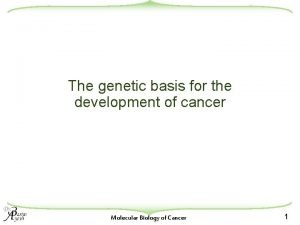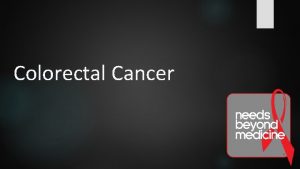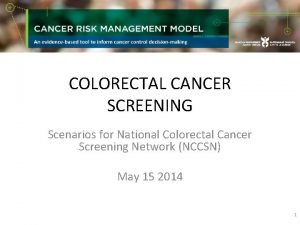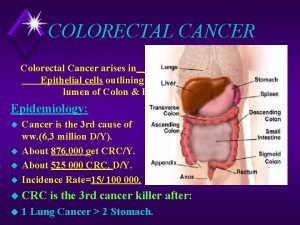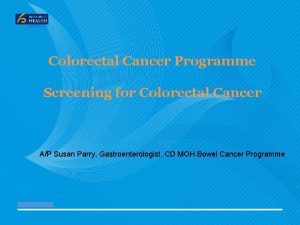Colorectal Cancer Introduction Colorectal cancer is a cancer












- Slides: 12

Colorectal Cancer

Introduction ● Colorectal cancer is a cancer that starts in the colon or the rectum. ● These cancers can also be named colon cancer or rectal cancer, depending on where they start ● Colon cancer and rectal cancer are often grouped together because they have many features in common.

Colorectal Cancer Statistics Excluding skin cancers, colorectal cancer is the third most commoncancer diagnosed in both men and women in the United States. The American Cancer Society’s estimates for the number of colorectal cancer cases in the United States for 2019 are: ● 101, 420 new cases of colon cancer ● 44, 180 new cases of rectal cancer Overall, the lifetime risk of developing colorectal cancer is: about 1 in 22 (4. 49%) for men and 1 in 24 (4. 15%) for women. Colorectal cancer is expected to cause about 51, 020 deaths during 2019.

How does colorectal cancer start? Most colorectal cancers start as a growth on the inner lining of the colon or rectum. These growths are called polyps. Some types of polyps can change into cancer over time (usually many years), but not all polyps become cancer. The chance of a polyp changing into cancer depends on the type of polyp it is. The 2 main types of polyps are: ● Adenomatous polyps (adenomas): These polyps sometimes change into cancer. Because of this, adenomas are called a pre-cancerous condition. ● Hyperplastic polyps and inflammatory polyps: These polyps are more common, but in general they are not pre-cancerous.

Types of Colon Cancer ● Adenocarcinomas Other less common types of tumors may also start in the colon and rectum. These include: ○ Carcinoid tumors ○ Gastrointestinal stromal tumors (GISTs) ○ Lymphomas ○ Sarcomas

Risk Factors ● A diet that is high in red meats and processed meats ● Lack of physical activity ● Obesity ● Smoking ● Heavy alcohol use ● Chances increase greatly after age 50 ● History of colorectal polyps ● Family or individual history of colon cancer ● Type II Diabetes

Signs and Symptoms of Colorectal Cancer ● A change in bowel habits, such as diarrhea, constipation, or narrowing of the stool, lasting more than a few days ● A feeling that you need to have a bowel movement that is not relieved by doing so ● Rectal bleeding ● Blood in the stool which may make it look dark ● Cramping or abdominal pain ● Weakness and fatigue ● Unintended weight loss

Prevention and Screening From the time the first abnormal cells start to grow into polyps, it usually takes about 10 to 15 years for them to develop into colorectal cancer. With regular screening, most polyps can be found and removed before they have the chance to turn into cancer. Regular colorectal cancer screening is one of the most powerful weapons for preventing colorectal cancer. If you’re age 45 or older, you should start getting screened for colorectal cancer. Several types of tests can be used. Talk to your health care provider about which ones might be good options for you.

Tests to Detect Colorectal Cancer ● High-sensitivity fecal occult blood tests (FOBT) ● Sigmoidoscopy ● Standard (or optical) colonoscopy ● Cologuard® ● Virtual colonoscopy ● Double-contrast barium enema ● Single-specimen guaiac FOBT done in a doctor's office

Treatment Local Treatment ● Ablation ● Surgery ● Radiation Therapy Systemic Treatment ● Chemotherapy ● Targeted Therapy ● Immunotherapy

Follow us! @Needs. Beyond. Med Facebook Instagram Twitter Linked. In You. Tube

References http: //www. cancer. gov/types/colorectal http: //www. mdanderson. org/patient-and-cancer-information/cancer-types/coloncancer/colorectal-full. jpg http: //www. cdc. gov/cancer/colorectal/statistics/race. htm http: //www. cancer. org/cancer/colonandrectumcancer/detailedguide/colorectal-cancer-risk-factors http: //www. cancer. org/cancer/colonandrectumcancer/detailedguide/colorectal-cancer-signs-and-symptoms https: //i. ytimg. com/vi/N 2 Wk. Sgm 076 w/maxresdefault. jpg http: //userfiles. steadyhealth. com/userfiles/articles/early_signs_of_colon_cancer. jpg http: //www. cancer. org/cancer/colonandrectumcancer/detailedguide/colorectal-cancer-what-is-colorectal-cancer http: //www. cancer. gov/types/colorectal/screening-fact-sheet http: //www. cancer. org/cancer/colonandrectumcancer/detailedguide/colorectal-cancer-treating-by-stage-colon http: //www. molecularonc. com/mor/images/mor 010118 table 1. jpg http: //cdn. healthworks. my/wp-content/uploads/2014/06/colorectal-cancer-screening. jpg https: //www. cancer. org/cancer/colon-rectal-cancer/about/what-is-colorectal-cancer. html









